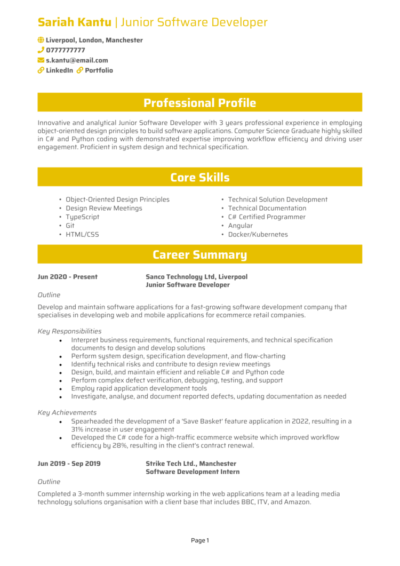You’ve debugged your fair share of errors, wrangled CSS until it behaved (mostly), and finally got that API to return something other than heartbreak. Now it’s time to put all that problem-solving energy into a new kind of challenge: writing a CV that makes hiring managers stop scrolling.
Whether you’re fresh out of university, recently retrained, or self-taught with a GitHub full of side projects, this guide, complete with Junior Software Developer example CVs, will help you package your potential to help you walk into rewarding new roles.
Junior Software Developer CV
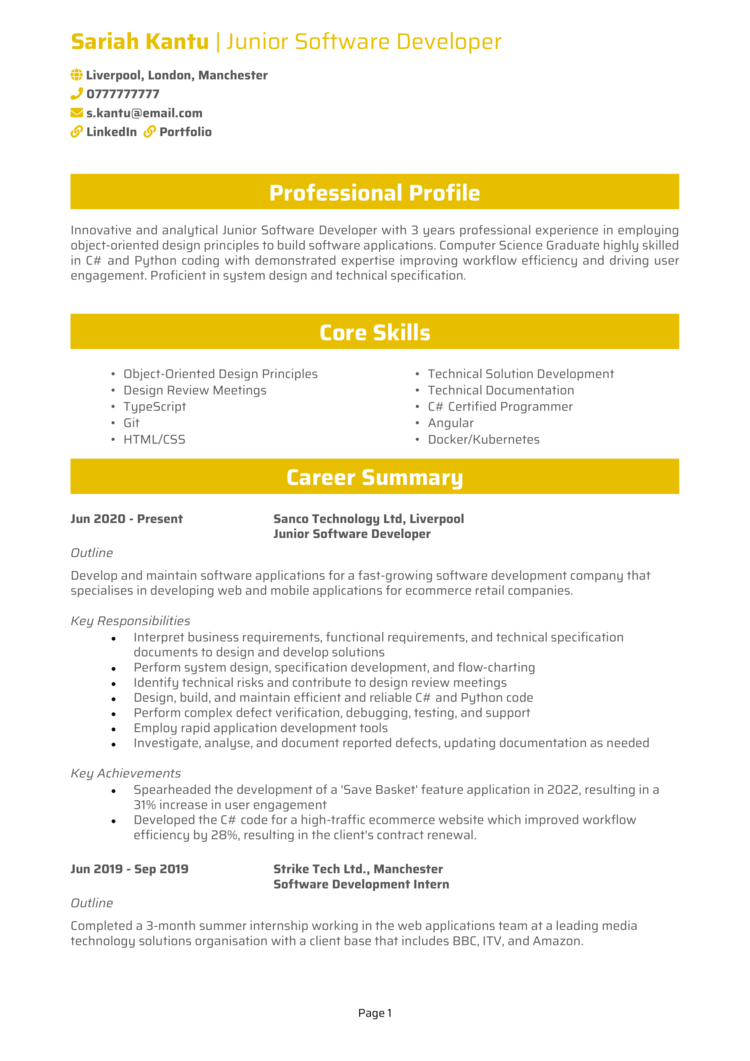
Entry Level Software Developer CV

Graduate Software Developer CV
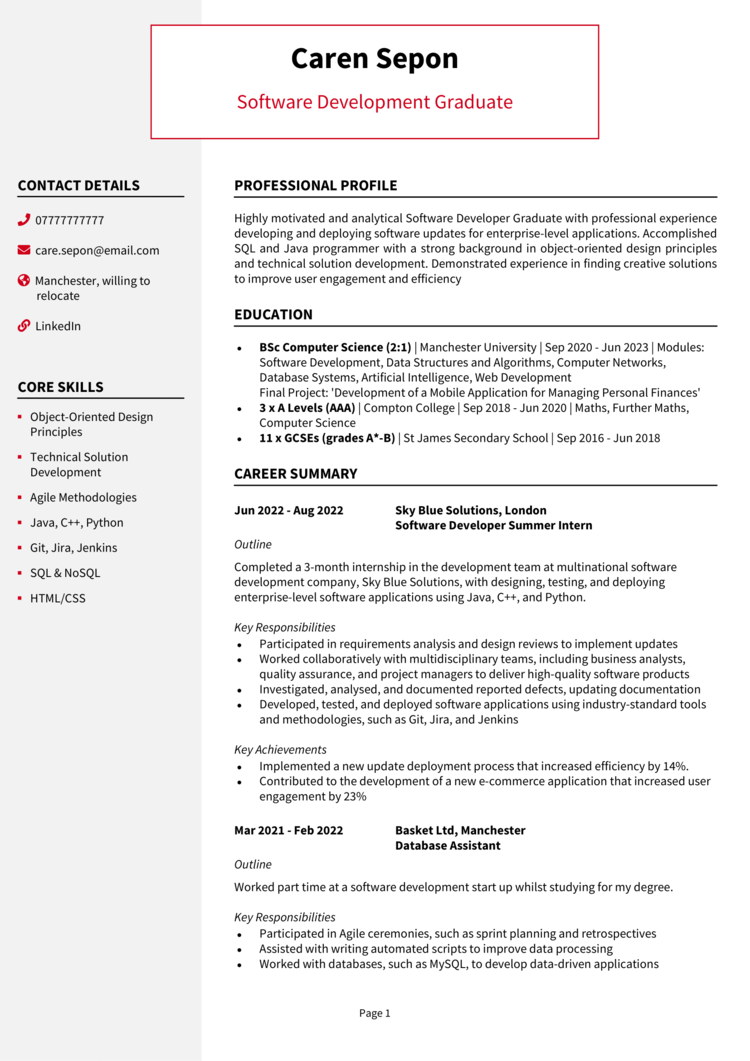
How to write your Junior Software Developer CV
Discover how to create a quality Junior Software Developer CV with this simple step-by-step guide.
Every line of your code is intentional – and your CV should be just as efficient and readable. It’s not just about what you’ve learned, but how you present it to the people who’ll decide if you join the team.
This guide will walk you through writing a CV to highlight your technical foundation and demonstrate your enthusiasm for software development – whether you’ve just finished university or completed a bootcamp.
How to structure and format your Junior Software Developer CV
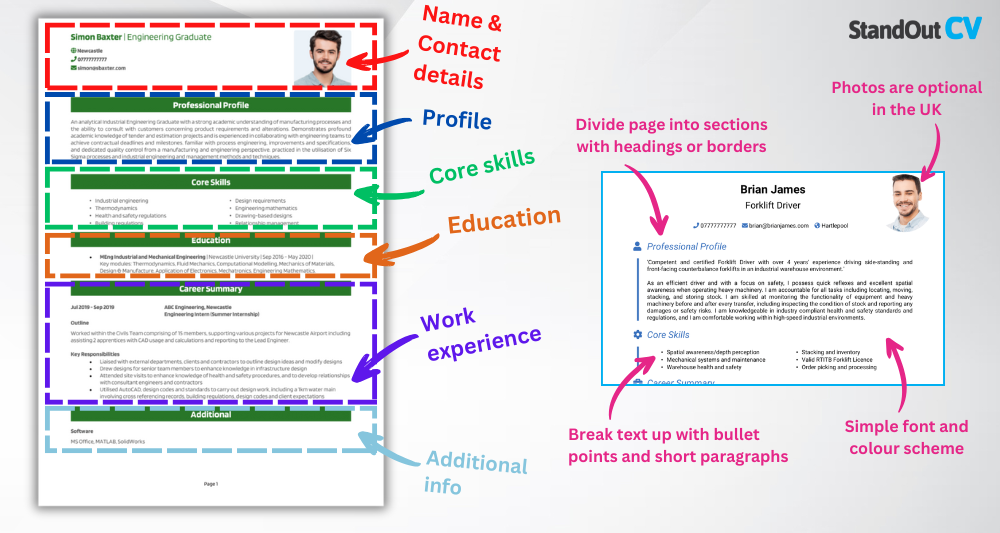
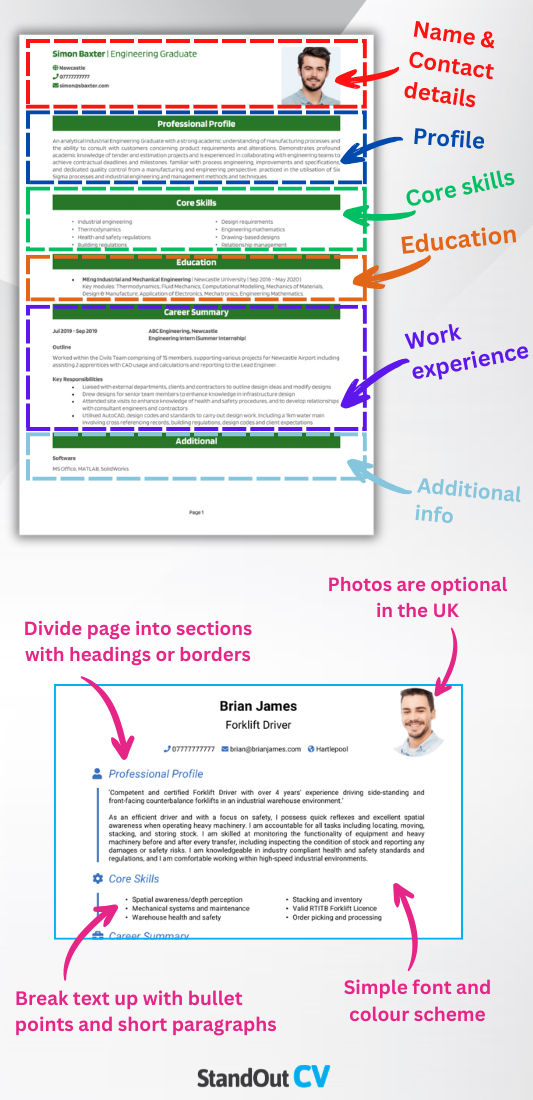
Your CV structure should follow the same principles as good code: clean and easy to navigate. Recruiters often skim CVs at speed, so yours needs to make it easy to find what matters before they move onto the next candidate. A messy layout full of mistakes will only make recruiters close the tab.
Here’s the layout to follow:
- Name and contact details – Display your personal details clearly at the top so employers can get in touch easily. Including a photo is entirely optional.
- Profile – Begin with a concise summary that highlights your expertise and what you bring to the role.
- Core skills – Bullet points highlighting your programming languages, tools, and strengths.
- Work experience – If you’ve done internships, freelance work, or even relevant non-dev roles, list them in reverse order.
- Education & certifications – Include degrees, bootcamps, or online learning credentials.
- Additional info – Optionally add personal projects, GitHub links, related hobbies, or hackathon experience.
Stick to a two-page length limit – the rest should stick to the cover letter. Make sure you break up content using bullet points for clarity, and divide each section with consistent, well-labelled headings. Choose a clean, readable font and keep spacing tidy – nobody wants to sift through a wall of text.
And just like in your code editor, consistency is key: formatting glitches can be distracting and make your CV look unfinished. Think of this section as your first chance to prove you understand good structure – it’s not just what you say, it’s how you present it.
How to write a Junior Software Developer CV profile


Your CV profile sits right at the top, so make those first few lines count. This is where you quickly communicate what kind of developer you are, what tools or languages you’re comfortable with, and what kind of opportunities you’re looking for.
Keep it focused and forward-looking, and make it clear that even if you’re still learning, you’ve already got a solid grasp of the fundamentals and a strong desire to contribute to real-world projects. As a junior candidate, consider using a personal statement instead: it allows for more detail on things like your overall aspiration.
Junior Software Developer CV profile examples
Profile 1
Motivated Junior Software Developer with hands-on experience in building web and desktop applications using Python, JavaScript, and HTML/CSS. Familiar with version control systems like Git and collaborative development workflows. Strong problem-solving skills and a keen interest in writing clean, maintainable code. Eager to contribute to dynamic development teams and grow within a fast-paced environment.
Profile 2
Enthusiastic Junior Software Developer with a background in computer science and experience developing small-scale projects using React, Node.js, and SQL. Adept at debugging, testing, and implementing new features based on user requirements. Strong communicator with a collaborative mindset, committed to learning best practices and modern development tools.
Things to have in your Junior Software Developer CV profile
Here’s some tips on what to include:
- Where you’ve trained or studied – Mention your degree, bootcamp, or learning pathway.
- Your top qualifications – Highlight technical coursework, certifications, or key modules.
- Essential skills – Name your strongest programming languages, libraries, or frameworks.
- Type of projects or environments – Whether you’ve built web apps, mobile games, or REST APIs.
- Personal traits – Show your eagerness to contribute, collaborate, and keep improving.
What to include in the core skills section of your CV


This section helps employers spot your technical strengths at a glance. It’s a chance to highlight the practical knowledge and CV skills you’ve already developed – whether that’s through formal education or hands-on work experience.
Avoid padding this part with buzzwords or soft skills. Focus on showing your real working knowledge of tools and methods relevant to the role. It’s also a smart place to tailor your CV – adjusting the focus slightly depending on whether you’re applying to a front-end, back-end, or full-stack position.
What are the most important skills for a Junior Software Developer CV?
- Code Development and Debugging – Writing, testing, and debugging code using programming languages such as Python, Java, C#, or JavaScript.
- Software Testing and QA Support – Assisting in the execution of unit tests, integration tests, and resolving software bugs.
- Version Control with Git – Using Git and platforms like GitHub or GitLab to manage code changes and collaborate with team members.
- Agile and Scrum Participation – Working in agile development environments, attending stand-ups, and contributing to sprint planning and reviews.
- API Integration – Implementing and consuming RESTful APIs to enable communication between front-end and back-end systems.
- Database Management – Writing basic SQL queries, managing data, and assisting with database updates or maintenance.
- User Interface Development – Contributing to front-end design using HTML, CSS, and JavaScript frameworks like React or Angular.
- Documentation and Commenting – Maintaining clear documentation of code, features, and system requirements.
- Collaboration with Senior Developers – Supporting senior engineers by contributing to tasks, learning from code reviews, and asking for feedback.
- Continuous Learning and Skill Development – Staying up to date with programming practices, tools, and technologies through training and self-study.
How to list your educational history


Your education is especially important early in your career, so list it clearly. Start with your most recent qualification, whether it’s a university degree, college course, or coding bootcamp.
Include the name of the institution, qualification type, and year. You can also mention specific modules (e.g. “Object-Oriented Programming”) or final-year projects. If you’ve completed online courses or certifications (like freeCodeCamp, Coursera, or Udemy), list those too – especially if they’re relevant to the job.
Example education sections
Education 1
First Class BSc (Hons) Computer Science | University of Manchester | 2020–2023
Modules included Software Engineering, Algorithms & Data Structures, Web Technologies, and Databases. Completed a final-year project developing a full-stack web application for real-time student collaboration.
3x A-Levels (A–B) | Eastbourne Sixth Form | 2018–2020
Subjects: Computer Science, Maths, Physics
9x GCSEs (A*–C) | Brighton High School | 2016–2018
Education 2
Merit HND Software Development | Edinburgh College | 2021–2023
Covered Object-Oriented Programming, Web Development, Mobile App Design, and Database Management. Completed a group project building a responsive web application for a local business using React and Firebase.
BTEC Level 3 National Diploma in IT (DD) | West Shore College | 2019–2021
Units included Programming, Cyber Security, and IT Project Management.
8x GCSEs (A–C) | Linwood Academy | 2017–2019
What to include in your education section
For each qualification, add the following info:
- Qualification & organisation – State the qualification and where you earned it.
- Dates studied – For each, give the start and end date (or the expected end date).
- Extra details – Some modules or courses will be more relevant than others for the jobs you’re applying for: expand on some to demonstrate your more specific expertise.
What are the best qualifications for a Junior Software Developer CV?
- BSc in Computer Science, Software Engineering, or similar – A strong academic foundation for dev roles.
- Coding Bootcamp Certification (e.g. Makers, General Assembly) – Demonstrates intensive, practical training.
- freeCodeCamp / Codecademy / Udemy / Coursera Certificates – Useful to highlight ongoing learning and specific tech skills.
- Final Year University Project or Capstone Project – Particularly if it shows real-world application.
- Hackathon Participation or Awards – Great for showing initiative, teamwork, and practical skill.
How to write a strong work experience section for your CV


Experience is experience – whether you earned it in a company, a classroom, or your bedroom at 1 a.m. after a coding binge. You don’t need to have held a formal developer job to have something valuable to say here – you likely already have impressive achievements.
Include internships, freelance projects, bootcamp assignments, or even well-executed university work. Been part of a hackathon? Built an app for fun? Solved a real problem with code? That belongs here too. List each role or project in reverse chronological order.
Structuring your jobs

- Outline – Give context about the company, project, or environment you worked in.
- Responsibilities – Use action words like “developed,” “debugged,” “collaborated,” or “tested” to show your contributions.
- Achievements – Show outcomes, such as “reduced load time by 20%,” “built app used by 100+ users,” or “won 2nd place at XYZ Hackathon.”
Example jobs for Junior Software Developers
Junior Software Developer | Bytebeam Solutions
Outline
Supported the development of internal web tools and customer-facing applications at a growing software consultancy, working alongside senior developers on client projects.
Responsibilities
- Assisted in building and maintaining web applications using React and Express.js.
- Wrote unit and integration tests to ensure code reliability.
- Participated in daily stand-ups and sprint planning within an Agile team.
- Resolved bugs and implemented feature requests based on user stories.
- Used Git and GitHub for version control and collaborative development.
Achievements
- Improved load speed of a client dashboard by 35% through front-end optimisation.
- Recognised for clear, well-documented code during peer reviews.
- Completed onboarding two weeks ahead of schedule by proactively engaging in team projects.
Junior Software Developer | NovaCraft Digital
Outline
Worked on small-scale development tasks and bug fixes for a SaaS platform offering scheduling and project management tools.
Responsibilities
- Updated UI components and styled front-end pages using HTML, CSS, and JavaScript.
- Collaborated with QA engineers to identify and resolve software defects.
- Contributed to back-end logic using Node.js and MongoDB.
- Maintained documentation for APIs and user-facing help guides.
- Attended code review sessions and incorporated feedback from senior developers.
Achievements
- Helped reduce the number of outstanding bugs by 40% during a sprint cycle.
- Developed a reusable component library to speed up future UI development.
- Praised for thorough documentation that improved onboarding for new developers.
Writing an additional info section


For junior software developers, the Additional Information section helps bring your personality and passion for tech to life – especially if you’re early in your career. It’s a great place to highlight self-taught projects, coding interests, and creative or problem-solving hobbies that showcase your enthusiasm and potential as a developer.
Good additional info for Junior Software Developers
- Hobbies – Tech-focused hobbies like building apps, automating tasks, or gaming can reflect curiosity and logical thinking. Non-tech hobbies that show focus, collaboration, or creativity also help round out your profile.
- Awards and Achievements – Coding challenges, hackathon wins, or academic recognitions help reinforce your skill level and commitment.
- Extracurricular Activities – Clubs, coding societies, or personal development groups show initiative, teamwork, and a passion for learning.
- Personal Projects – Side projects, portfolio pieces, or open-source contributions can showcase your abilities when you’re just starting out professionally.
Additional info example
Additional info
Hobbies
Building web tools – Created small web-based tools to automate personal tasks, such as a to-do list with email reminders.
Competitive gaming – Play strategy-based games that build decision-making and collaborative skills under pressure.
Digital drawing – Design user interface mockups and icons for personal projects, developing creativity and an eye for UI/UX design.
Awards and Achievements
Hackathon finalist – Built a basic budgeting app in a 24-hour coding event, earning recognition for functionality and clean code.
Top mark in Software Engineering module – Scored the highest grade in a group coding project for clean design and documentation.
Extracurricular Activities
Coding club member – Collaborated with peers to learn new languages and build small-scale group projects.
STEM outreach volunteer – Helped teach coding basics to younger students at school open evenings.
Personal Projects
Portfolio website – Designed and built a personal site to host projects and showcase skills using HTML, CSS, and JavaScript.
GitHub contributions – Regularly commit to open-source repositories and share personal projects, including a simple weather app and quiz game.


